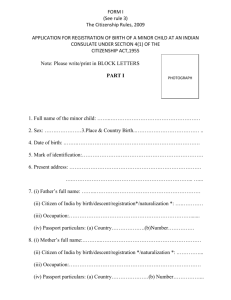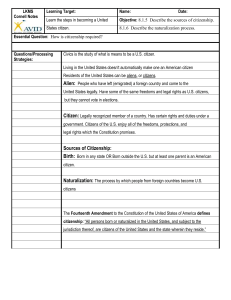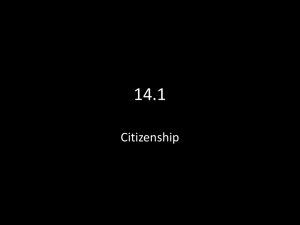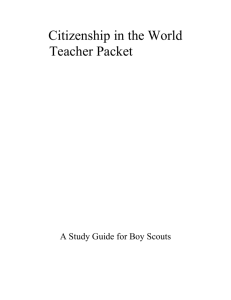Sample N-600 Cover Letter for Derivation
advertisement
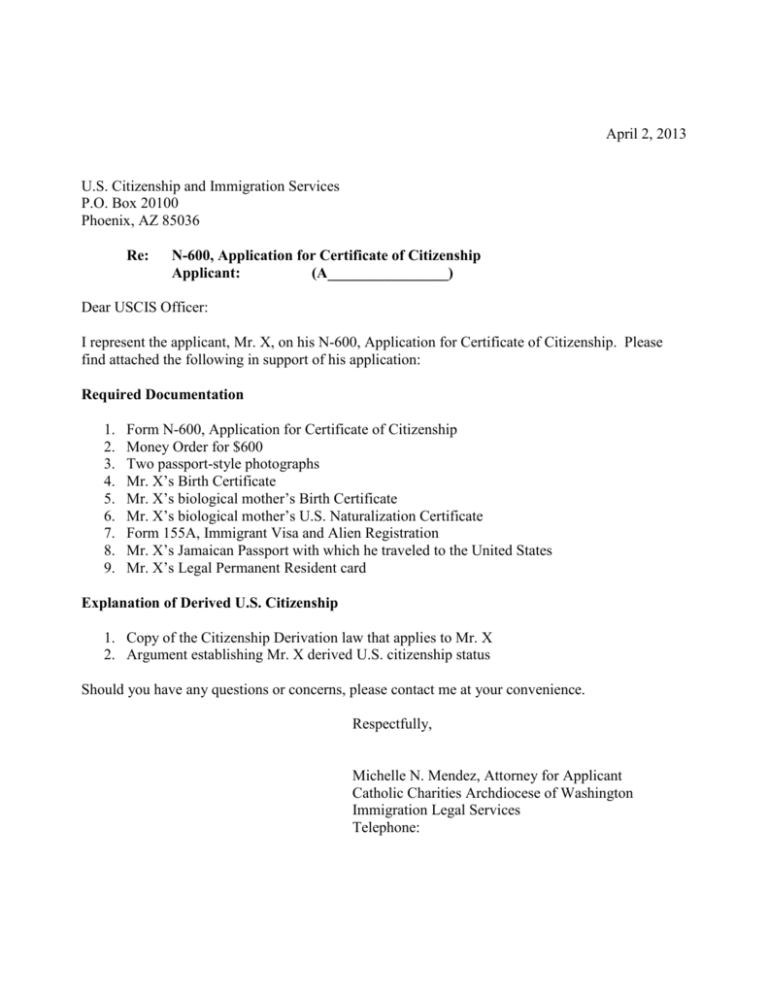
April 2, 2013 U.S. Citizenship and Immigration Services P.O. Box 20100 Phoenix, AZ 85036 Re: N-600, Application for Certificate of Citizenship Applicant: (A________________) Dear USCIS Officer: I represent the applicant, Mr. X, on his N-600, Application for Certificate of Citizenship. Please find attached the following in support of his application: Required Documentation 1. 2. 3. 4. 5. 6. 7. 8. 9. Form N-600, Application for Certificate of Citizenship Money Order for $600 Two passport-style photographs Mr. X’s Birth Certificate Mr. X’s biological mother’s Birth Certificate Mr. X’s biological mother’s U.S. Naturalization Certificate Form 155A, Immigrant Visa and Alien Registration Mr. X’s Jamaican Passport with which he traveled to the United States Mr. X’s Legal Permanent Resident card Explanation of Derived U.S. Citizenship 1. Copy of the Citizenship Derivation law that applies to Mr. X 2. Argument establishing Mr. X derived U.S. citizenship status Should you have any questions or concerns, please contact me at your convenience. Respectfully, Michelle N. Mendez, Attorney for Applicant Catholic Charities Archdiocese of Washington Immigration Legal Services Telephone: Applicable Citizenship Derivation Law The prior law on citizenship derivation, Section 321(a) of the Immigration and Nationality Act of 1952, former 8 U.S.C. 1432(a), which was repealed on October 30, 2000 by P.L. 106-395, states the following: (a) A child born outside of the United States of alien parents, or of an alien parent and a citizen parent who has subsequently lost citizenship of the United States, becomes a citizen of the United States upon fulfillment of the following conditions: (1) The naturalization of both parents; or (2) The naturalization of the surviving parent if one of the parents is deceased; or (3) The naturalization of the parent having legal custody of the child when there has been a legal separation of the parents or the naturalization of the mother if the child was born out of wedlock and the paternity of the child has not been established by legitimation; and if (4) Such naturalization takes place while such child is under the age of eighteen years; and (5) Such child is residing in the United States pursuant to a lawful admission for permanent residence at the time of the naturalization of the parent last naturalized under clause (1) of this subsection, or the parent naturalized under clause (2) or (3) of this subsection, or thereafter begins to reside permanently in the United States while under the age of eighteen years. Pub. L. 95–417, §4, Oct. 5, 1978, 92 Stat. 9171 When all the conditions in this section are met before the child’s 18th birthday, the child derives citizenship regardless of the order in which the events occurred. “New Interpretation of Claims to Citizenship Under Section 321(a) of the INA”, Department of State’s Passport Bulletin 96-18 (November 6, 1996). 1 This law applies to those cases where the parent(s) naturalize(s) on or after December 24, 1952 but before February 27, 2001 when the new law, P.L. 106-395, was enacted. Explanation of Mr. X’s derived U.S. citizenship status Mr. X is a citizen of the United States according to the prior derivative citizenship statute. Pub. L. 95–417, §4, Oct. 5, 1978, 92 Stat. 917. Born out of wedlock and without subsequent legitimated paternity, Mr. X became a citizen of the United States as a matter of law at the age of seventeen, when he was admitted and began residing in the United States with his U.S. Citizen mother X. The attached documentation supports Mr. X’s claim of U.S. citizenship. Mr. X submits a copy of his birth certificate, copy of his mother’s Naturalization Certificate, copy o f his mother’s birth certificate, copy of his immigrant visa and alien registration, and Jamaican passport with which he traveled to the United States. Mr. X’s birth certificate establishes his identity, age, and mother’s identity. As the birth certificate proves, Mr. X was born on January 8, 1971 in Jamaica to Sybil Ellis, who was a native and citizen of Jamaica at the time of his birth. The birth certificate is void of a father’s name because Mr. X fwas born out of wedlock and his father has never recognized him. Mr. X’s mother’s U.S. Naturalization Certificate establishes the U.S. citizenship of the parent at issue from whom Mr. X derived U.S. Citizenship as well as the date on which she became a U.S. citizen. Mr. X’s mother became a U.S. citizen on September 9, 1986 when Mr. X was fifteen years old. Mr. X’s Immigrant Visa and Alien Registration Form, passport, and legal permanent resident card establish the date on which his residence in the United States began pursuant to a lawful admission for permanent residence: September 10, 1988, when Mr. X was seventeen years old. Therefore, Mr. X automatically derived citizenship at the age of seventeen on September 10, 1988, when he began residing in the United States pursuant to a lawful admission for permanent residence while under the age of eighteen years. On that date all of the requirements pursuant to Section 321(a) of the INA of 1952, formerly 8 U.S.C. 1432(a), were met. Event Date Mr. X is born January 8, 1971 Mr. X’s mother becomes a naturalized U.S. citizen September 9, 1986 (15 yrs) Mr. X is admitted into the United States as a legal permanent resident September 10, 1988 (17 yrs)
